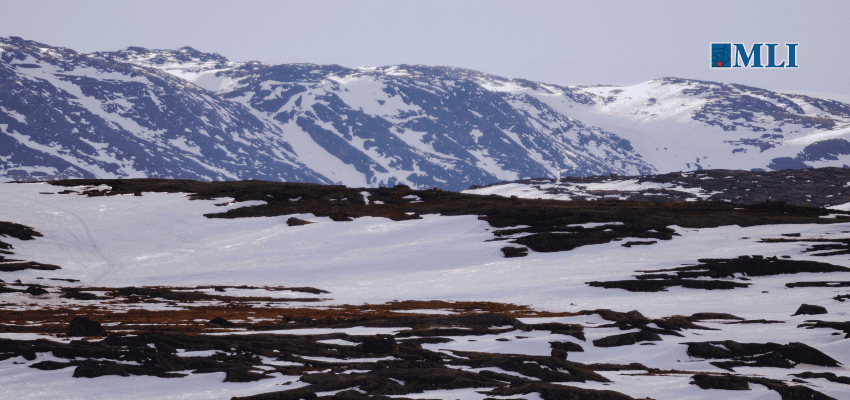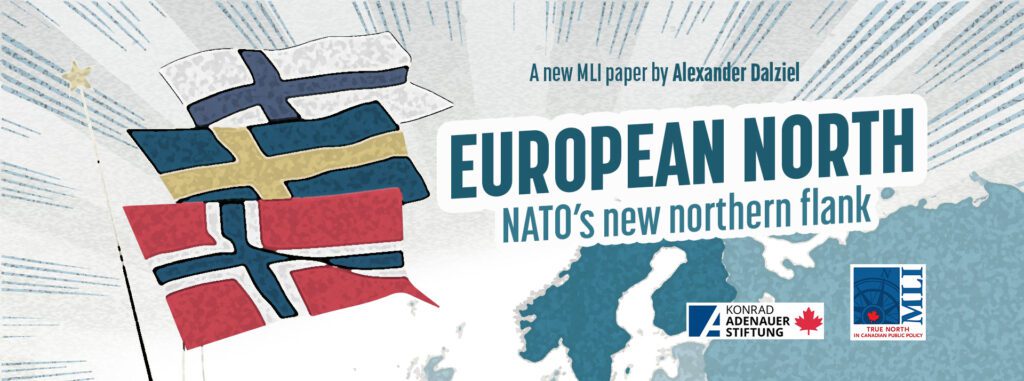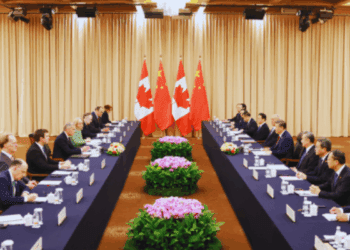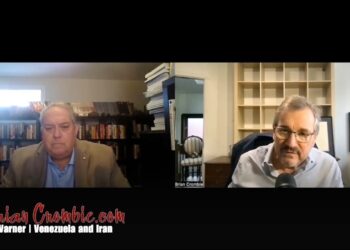This article originally appeared in the Hub.
By Rob Huebert, November 26, 2024
The election of Donald Trump is poised to dramatically impact Canada’s efforts to deal with two existential threats that we face in the Arctic. The threats—climate change and geopolitical change—are two of the most dangerous threats confronting this country. Canada can expect a number of challenges to its existing policies in the North and can also expect to face direct American opposition to others.
Climate change is transforming the Arctic. Warming temperatures that are melting the ice is the best-known effect, but there are numerous other changes occurring, such as changing animal habitats and migration of species such as caribou, polar bears, and killer whales. Canada’s efforts to respond and mitigate these changes will be hampered by the White House’s reluctance to even accept the existence of climate change under a Trump presidency. During his last term in office, Trump instructed his senior officials to be obstructive in taking any action against these problems in the Arctic.
At the Arctic Council, then Secretary of State Mike Pompeo refused to allow the United States to be associated with any document that even mentioned climate change as a problem, let alone offer steps to respond. While Trump has not yet offered a renewed position on the Arctic’s rapidly shifting climate, it is unlikely his administration will be more willing to act this time around. One can get a sense of how he feels about the issue by the cabinet he has started to form, most if not all of whom are not supportive of environmental protection policies. Beyond being obstructive at the Arctic Council and other arctic-based international forums, Trump will (after facing previous hurdles in his last administration) make a real push for the reopening of oil development in the waters off Alaska thus ending the North American northern oil and gas drilling moratorium agreed to by President Obama and Prime Minister Trudeau.
The second existential threat faced by Canada in the Arctic is the changing geopolitical situation. Following the invasion of Ukraine in 2014, there has been a growing recognition that Russia is growing as a threat to both Western and Canadian security. Given the location of the bulk of Russia’s nuclear-capable forces in its northern territories, the importance of the Arctic as a theatre of military operations has been growing.
Canada has at least formally accepted the existence of this threat. In 2014, at the Wales NATO summit, it agreed to increase defence expenditures to 2 percent of its GDP. The Trudeau government’s 2017 Defence policy Strong, Secure, Engaged also recognized the growing strategic importance of the Arctic and promised to take action to modernize its commitment to the North American Aerospace Defense Command (NORAD) agreement. In 2024, the defence update Our North, Strong and Free: A Renewed Vision for Canada’s Defence again restated Canada’s acknowledgement of the growing security threat in the North and again promised to act. The problem is that Canada’s actions have not kept pace with its promises. It has never come close to meeting its 2 percent NATO commitment and much of its promises to modernize NORAD and procure other needed defence capital projects, such as the replacement of its fighters central to the defence of its Arctic region, are only now being started.
The process to begin the purchase of new submarines required for the protection of northern waters was only announced in the summer of 2024. Government reports have highlighted how little has been done to provide for the modernization of NORAD’s capability to detect the current Russian missile threat either with modern radar systems or with satellite capabilities. The lack of meaningful progress on purchasing fighter replacement, submarines and new radar systems has been highlighted even by former members of the Liberal government such as Andrew Leslie testifying to the Standing Committee on National Defence, who also noted “Canada has fewer than 300 military support staff who are not a deterrent—they’re essentially unarmed…’[t]hank you America for defending our Arctic.”
This lack of action was noted by American officials even before the re-election of Trump. In a rare bipartisan action, a group of Democrat and Republican senators issued a letter in May 2024 in which they called upon Canada to do more to contribute to the defence of North America and to meet its NATO spending commitment. These pressures will increase under Trump, who has very publicly criticized and threatened allies who, in his opinion, are not meeting their obligations for the collective defence of the continent. Trump has openly called into question American continued support of NATO where, in his view, the Europeans are “free-riding” on the United States. There is little reason to expect that Canada will not face similar criticisms since it has even fallen behind most of the other European states in meeting its defence commitments.
What gives the Arctic region even more importance is the developing nuclear strategic dimension of Russian aggression. Russia has been increasing and modernizing its nuclear-capable forces deployed in the North. Putin has also been increasingly threatening to use these weapons. The Americans have recognized this threat and begun an extensive modernization of its own nuclear deterrent force to counter these threats.
They have also started to consider the possibility that nuclear deterrence may fail and require the actual use of such weapons. For deterrence to succeed and to avoid the horrifying possibility of nuclear war, the North American northern boundary requires defensive systems that will warn against any possible Russian attack and provide the means of defending against them if necessary. Canada’s reluctance to modernize its component of the detection and surveillance systems will undoubtedly be a major issue of concern for a Trump administration fixated on ensuring that its allies meet their commitments and help protect America’s borders.
Canada’s defence update is clearly an attempt to assure the Americans that we are serious about defending the Arctic. It is also expected that a new Arctic foreign policy will soon be released, acting as another attempt to try to reassure the Americans about Canada’s commitment. But the challenge facing Canada is whether Trump will actually believe Canadian defence promises, given our long record of strong statements but weak action.
Going forward, Canada will face an American government that does not believe in the threat of climate change in the Arctic region and an administration that will remain skeptical of Canada’s commitment to meet its defence commitments in the region. It is still in America’s interest to do all it can to encourage Canada to adequately defend its Arctic regions, but it is unlikely the Trump administration will show any understanding or sympathy to Canada’s current efforts, given its past actions towards allies. We are seen as being a laggard. This could mean that other aspects of the American-Canadian relationship will suffer until Trump believes we have done enough.
Canada’s efforts to defend against the twin threats of climate change and security in the Arctic are going to become much more problematic under the Trump administration. This country will have to demonstrate through its actions not statements that it is serious about the North.







